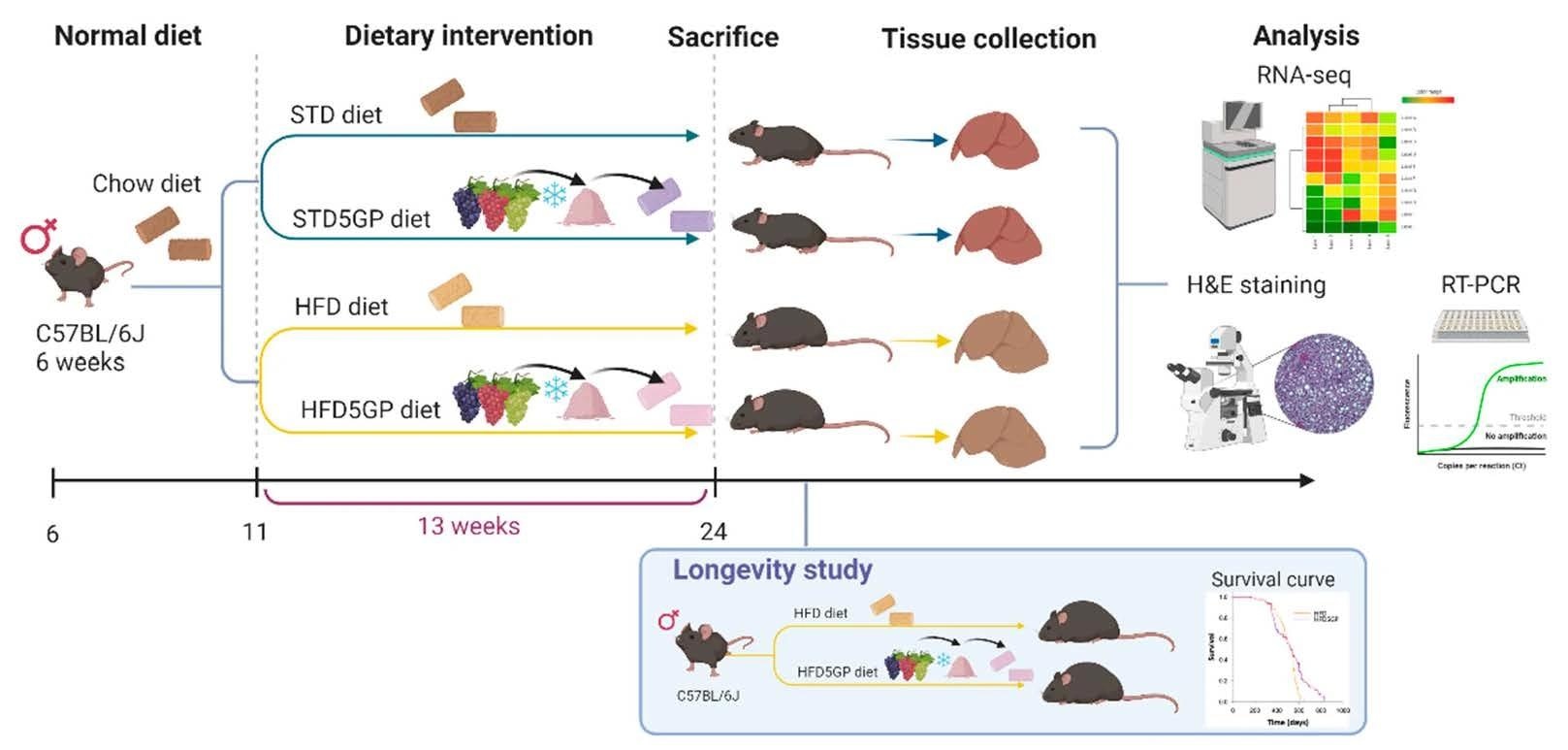Nutrition plays an essential role in maintaining health, avoiding disease onset, and improving longevity. The basic concept of a healthy diet includes higher consumption of vegetables, fruits, and whole grains and lower consumption of trans-fat, saturated fats, and refined carbohydrates. According to the US Department of Agriculture economics research service, a daily diet should include at least two cups of fruit and 2.5 cups of vegetables.
Vegetables and fruits are vital for maintaining the body’s homeostasis and ameliorating pathological conditions. In recent years, evidence has accumulated that vegetables and fruits can modulate gene expression and regulate metabolic pathways.
Grapes are considered wonder fruits. The bioactive components of grapes are known to modulate the pathophysiology of various diseases, including diabetes, obesity, cancer, and inflammatory diseases. In addition, grape components are also known to control the aging process and improve longevity.
In the current study, the scientists have evaluated the efficacy of grapes in mitigating adverse health effects induced by a high-fat western-pattern diet.
A diet rich in saturated fats, refined carbohydrates, and salt increases the risk of obesity, cardiovascular disease, and metabolic diseases, such as diabetes and non-alcoholic fatty liver disease. The diet is also known to reduce the lifespan of mice by 34%.
The scientists specifically aimed to understand the impact of grape consumption on hepatic gene expression, lipid metabolism, longevity, and non-alcoholic fatty liver disease. Mice fed with a 5% grape powder-supplemented high-fat diet or semi-synthetic diet were used as experimental models.
The supplementation of mice with 5% grape powder was estimated to be equivalent to the daily consumption of about 300 gm of fresh grapes by a person weighing 70 kg.

Important observations
Grape supplementation in standard semi-synthetic diet
One part of the study investigated the difference in gene expression between the mice fed with a standard diet with and without grape supplementation.
The RNA-sequencing analysis revealed distinct differences between the two groups. Specifically, grape supplementation caused an induction in the structural integrity in the ribosome, mitochondrial protein complex, and protein translation pathways. The enrichment of ribosomal genes is associated with cell growth, proliferation, differentiation, and development.
Furthermore, an enrichment in drug metabolism, detoxification, antioxidant, and oxidative stress-related pathways was observed in mice fed with a grape-supplemented standard diet. Glutathione-S-transferase P1 (GSTP1) is an antioxidant enzyme and is commonly involved in these pathways. The RNA-seq findings revealed that grape supplementation increases the expression of GSTP1, in addition to inducing the expressions of other antioxidant enzymes, including glutathione peroxidase, glutathione synthetase, and superoxide dismutase.
These findings indicate that dietary grape supplementation helps maintain cellular redox homeostasis, neutralize reactive free radicals, and prevent oxidative stress.
Grape supplementation in a high-fat diet
Consumption of a high-fat diet increases the risk of various health complications, including non-alcoholic fatty liver disease. The worldwide prevalence of this disease is estimated to be approximately 25%.
The comparison between mice fed with a high-fat diet with and without grape supplementation revealed that grape consumption reduces lipid accumulation in the liver, a major hallmark of non-alcoholic fatty liver disease.
The RNA-seq findings revealed differential expression of over 5600 genes between the two groups. Several of these genes are involved in reducing fatty liver, including mitochondrial and peroxisomal degradation, esterification, phospholipid metabolism, sequestration, and hydrolysis.
Further analysis revealed that grape supplementation is associated with the regulation of high-fat diet-induced catabolic processes and enrichment of mitochondrial energy metabolism. Specifically, grape supplementation increased the expression of genes related to fatty acid transportation and degradation, esterification, and free fatty acid sequestration.
It was also observed that grape supplementation negatively regulates the expression of genes associated with lipid content enrichment, cholesterol synthesis, and redistribution of lipids from muscle and fat to the liver.
Since a high-fat diet is known to reduce the lifespan in mice, the study also investigated the effect of grape supplementation on longevity. The findings revealed that lifetime dietary grape consumption is associated with significant improvement in survival.
As observed in the study, alterations in fatty liver-related gene expressions by grapes might have helped reduce the detrimental effects of a high-fat diet, which subsequently helped improve lifespan in mice.
A modest enrichment in adiponectin receptor gene expression was observed in mice supplemented with grape. The overexpression of adiponectin receptors is known to improve glucose metabolism and hepatic insulin sensitivity, justifying the positive impact of grape consumption on longevity.
Study significance
Researchers found grape consumption was helpful in reducing the risk of high-fat diet-induced non-alcoholic fatty liver disease in mice, as well as improving their longevity. In addition, by altering gene expression patterns, grapes mitigate the adverse effects of a high-fat diet.
Journal reference:
- Dave A. 2022. Consumption of Grapes Modulates Gene Expression, Reduces Non-Alcoholic Fatty Liver Disease, and Extends Longevity in Female C57BL/6J Mice Provided with a High-Fat Western-Pattern Diet. Foods. https://www.mdpi.com/2304-8158/11/13/1984/htm